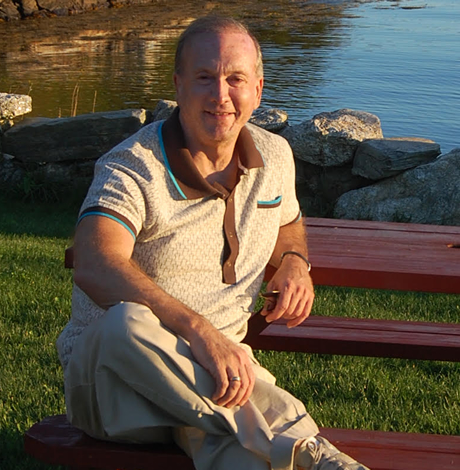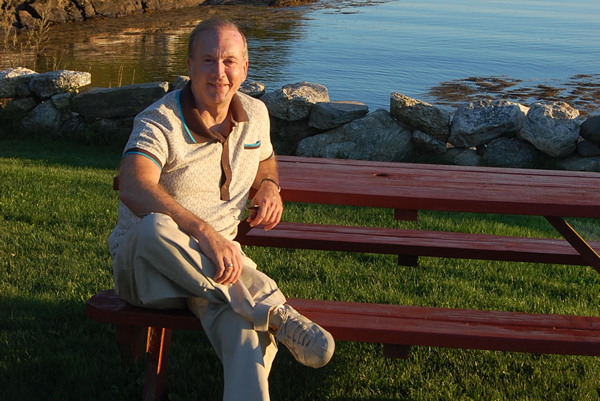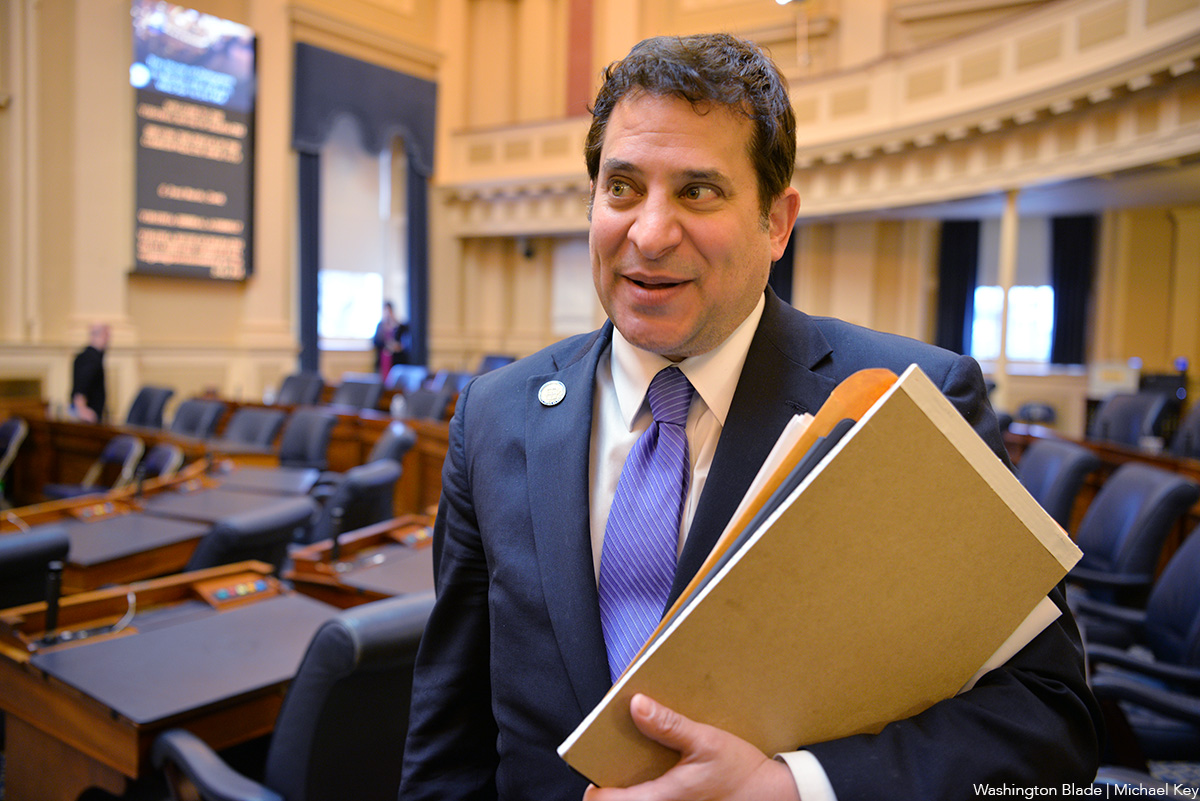Local
Personnel executive, volunteer Patrick Bruyere dies at 62
Served on board of Whitman-Walker’s N. Virginia facility


Patrick Richard Bruyere
Patrick Richard Bruyere, a longtime D.C.-area resident who worked as a high-level human resources official for several prominent organizations and companies and devoted years of volunteer work for LGBT and AIDS related causes, died Dec. 28 of esophageal cancer at a hospice in Arlington, Va. He was 62.
Friends who knew him, including Kate Mattos, who became friends with him during their years at Arlington’s Washington Lee High School, describe him in a write-up about his life as an intellectually engaged individual who embraced life and his friendships to the fullest.
Mattos said the write-up was based on information Bruyere left for his close friends shortly before his death. Among other things, it says he loved and collected art, enjoyed dance and the theater, was an avid runner who completed three marathons and a triathlon, and closely followed the news and current events.
“He delighted in engaging in debates about the wisdom and follies of political leaders,” the write-up says.
Mattos said Bruyere was born and raised in Arlington as an only child. He graduated from Virginia Commonwealth University in 1977 with a degree in Human Resources and Labor Relations, according to the write-up.
Among the companies and organizations for which he worked after completing college as a personnel and human resources executive included the Columbia, Md.-based W.R. Grace & Company, which manufactured chemical and household products; Westin Hotels; the World Wildlife Fund, and the American Red Cross.
“He was proud that his last position was at the American Red Cross in Washington, D.C., where he worked for 15 years before retiring in 2016,” the write-up says.
It says he was proudest of his volunteer work, including his tenure as a board member of the then Northern Virginia facility of the Whitman-Walker Clinic. Among other endeavors, he helped in fundraising efforts for AIDS prevention and assistance programs with Doreen Gentzler of NBC4 and with the CEO of the National Retail Federation through it’s “Shopping for Life” program.
He also became involved in fundraising efforts to acquire art books for children in D.C. as part of a program organized by the D.C. LGBT film festival Reel Affirmations, the write-up says. In addition, it says he helped build homes in D.C. as part of a 2014 project organized by the volunteer home building charity Habitat for Humanity called the Rainbow Build. The D.C. group Capital Pride was among the local LGBT organizations involved in the project, according to a Habitat for Humanity statement.
“Through the years, Patrick battled illnesses, including a rare blood cancer, aggressive squamous cell carcinoma, and Hodgkin’s lymphoma,” the write-up says. “He fought against the odds and survived each one. Even through his final struggle with esophageal cancer, he persisted in doing all he could to maintain his health and ability to love life,” it says. “His will was remarkable.”
His friend Steve Wunder said Bruyere was a longtime HIV survivor.
“I feel he should take pride in his HIV battle, which he won the fight in,” said Wunder.
A celebration of his life will be held on Saturday, March 3 from 1-3 p.m. at Friends Meeting of Washington, D.C., 2111 Florida Ave., N.W.
“His friends urge that donations in Patrick’s name be given to the charity of your choice,” the write-up concludes.
Virginia
Mark Levine loses race to succeed Adam Ebbin in ‘firehouse’ Democratic primary
State Del. Elizabeth Bennett-Parker won with 70.6 percent of vote

Gay former Virginia House of Delegates member Mark Levine (D-Alexandria) lost his race to become the Democratic nominee to replace gay state Sen. Adam Ebbin (D-Alexandria) in a Jan. 13 “firehouse” Democratic primary.
Levine finished in second place in the hastily called primary, receiving 807 votes or 17.4 percent. The winner in the four-candidate race, state Del. Elizabeth Bennett-Parker, who was endorsed by both Ebbin and Gov.-elect Abigail Spanberger received 3,281 votes or 70.6 percent.
Ebbin, whose 39th Senate District includes Alexandria and parts of Arlington and Fairfax Counties, announced on Jan. 7 that he was resigning effective Feb. 18, to take a job in the Spanberger administration as senior advisor at the Virginia Cannabis Control Authority.
Results of the Jan. 13 primary, which was called by Democratic Party leaders in Alexandria, Arlington, and Fairfax, show that candidates Charles Sumpter, a World Wildlife Fund director, finished in third place with 321 voters or 6.9 percent; and Amy Jackson, the former Alexandria vice mayor, finished in fourth place with 238 votes or 5.1 percent.
Bennett-Parker, who LGBTQ community advocates consider a committed LGBTQ ally, will now compete as the Democratic nominee in a Feb. 10 special election in which registered voters in the 39th District of all political parties and independents will select Ebbin’s replacement in the state senate.
The Alexandria publication ALX Now reports that local realtor Julie Robben Linebery has been selected by the Alexandria Republican City Committee to be the GOP candidate to compete in the Jan. 10 special election. According to ALX Now, Lineberry was the only application to run in a now cancelled special party caucus type event initially called to select the GOP nominees.
It couldn’t immediately be determined if an independent or other party candidate planned to run in the special election.
Bennett-Parker is considered the strong favorite to win the Feb. 10 special election in the heavily Democratic 39th District, where Democrat Ebbin has served as senator since 2012.
District of Columbia
Ruby Corado sentenced to 33 months in prison
Former Casa Ruby director pleaded guilty to wire fraud in 2024

A federal judge on Jan. 13 sentenced Ruby Corado, the founder and former executive director of the now closed D.C. LGBTQ community services organization Casa Ruby, to 33 months of incarceration for a charge of wire fraud to which she pleaded guilty in July 2024.
U.S. District Court Judge Trevor M. McFadden handed down the sentence that had been requested by prosecutors with the Office of the U.S. Attorney for the District of Columbia after Corado’s sentencing had been postponed six times for various reasons.
The judge also sentenced her to 24 months of supervised release upon her completion of incarceration.
In addition to the sentence of incarceration, McFadden agreed to a request by prosecutors to hold Corado responsible for “restitution” and “forfeiture” in the amount of $956,215 that prosecutors have said she illegally misappropriated from federal loans obtained by Casa Ruby.
The charge to which she pleaded guilty is based on allegations that she diverted at least $180,000 “in taxpayer backed emergency COVID relief funds to private offshore bank accounts,” according to court documents.
Court records show FBI agents arrested Corado on March 5, 2024, at a hotel in Laurel, Md., shortly after she returned to the U.S. from El Salvador, where authorities say she moved in 2022. Prosecutors have said in charging documents that she allegedly fled to El Salvador, where she was born, after “financial irregularities at Casa Ruby became public,” and the LGBTQ organization ceased operating.
Shortly after her arrest, another judge agreed to release Corado into the custody of her niece in Rockville, Md., under a home detention order. But at an Oct. 14, 2025, court hearing at which the sentencing was postponed after Corado’s court appointed attorney withdrew from the case, McFadden ordered Corado to be held in jail until the time of her once again rescheduled sentencing.
Her attorney at the time, Elizabeth Mullin, stated in a court motion that her reason for withdrawing from the case was an “irreconcilable breakdown in the attorney-client relationship.”
Corado’s newly retained attorney, Pleasant Brodnax, filed a 25-page defense Memorandum in Aid of Sentencing on Jan. 6, calling for the judge to sentence Corado only to the time she had already served in detention since October.
Among other things, Brodnax’s defense memorandum disputes the claim by prosecutors that Corado improperly diverted as much as $956,215 from federally backed loans to Casa Ruby, saying the total amount Corado diverted was $200,000. Her memo also states that Corado diverted the funds to a bank account in El Salvador for the purpose of opening a Casa Ruby facility there, not to be used for her personally.
“Ms. Corado has accepted responsibility for transferring a portion of the loan disbursements into another account she operated and ultimately transferring a portion of the loan disbursements to an account in El Salvador,” the memo continues.
“Her purpose in transferring funds to El Salvador was to fund Casa Ruby programs in El Salvador,” it says, adding, “Of course, she acknowledges that the terms of the loan agreement did not permit her to transfer the funds to El Salvador for any purpose.”
In his own 16-page sentencing recommendation memo, Assistant U.S. Attorney John Borchert, the lead prosecutor in the case, said Corado’s action amounted at the least to fraud.
“The defendant and Casa Ruby received no less than $1.2 million in taxpayer backed funds during the COVID-19 global health crisis,” he memo states. “But rather than use those funds to support Casa Ruby’s mission as the defendant promised, the defendant further contributed to its demise by unlawfully transferring no less than $180,000 of these federal emergency relief funds into her own private offshore bank accounts,” it says.
“Then, when media reports suggested the defendant would be prosecuted for squandering Casa Ruby’s government funding, she sold her home and fled the country,” the memo states. “Meanwhile, the people who she had promised to pay with taxpayer-backed funds – her employees, landlord, and vendors – were left behind flat broke.”
A spokesperson for the U.S. Attorney’s office and Corado’s attorney didn’t immediately respond to a request from the Washington Blade for comment on the judge’s sentence.
“Ms. Corado accepts full responsibility for her actions in this case,” defense attorney Brodnax says in her sentencing memo. “She acknowledges the false statements made in the loan applications and that she used some of the money outside the United States,” it says.
“However, the money was still utilized for the same purpose and intention as the funds used in the United States, to assist the LGBTQ community,” it states. “Ms. Corado did not use the money to buy lavish goods or fund a lavish lifestyle.”
Brodnax also states in her memo that as a transgender woman, Corado could face abuse and danger in a correctional facility where she may be sent if sentenced to incarceration.
“Ruby Corado committed a crime, she is now paying the price,” said D.C. LGBTQ rights advocate Peter Rosenstein. “While it is sad in many ways, we must remember she hurt the transgender community with what she did, and in many ways they all paid for her crime.”
Virginia
Woman arrested for anti-gay assault at Alexandria supermarket
Victim recorded video of Christmas Day attack

Alexandria police announced on Jan. 12 that a Maryland woman has been arrested for allegedly assaulting a man while shouting anti-gay slurs at him at a Giant supermarket in Alexandria on Christmas Day.
The arrest came after a video of the assault that the victim captured with his phone and on which the woman can be heard shouting anti-gay slurs went viral on social media.
Police identified the woman as Shibritney Colbert, 34, of Landover, Md. Alexandria Police Chief Tarrick McGuire stated at a news conference that police responded to a 911 call placed by the victim and attempted to apprehend the woman, but she drove off in her car before police could apprehend her.
He said following an investigation, Colbert was apprehended and arrested in Prince Goerge’s County, Md., on Jan. 8. He said arrangements were being made for her to be brought to Alexandria where she was expected to face charges of assault and battery, destruction of property, felony eluding, and driving an unregistered vehicle.
The video of the incident shows Colbert pushing a shopping cart she was using in an aisle at the Giant store, located at 3131 Duke St., into the victim and another woman who was trying to help the victim. She can be seen throwing groceries at the victim while shouting anti-gay names. “Boy, get out of here with your gay ass,” was among the words she yelled at him that could be heard on the video.
The victim, who police identified only as a 24-year-old man, could be heard on the video saying he does not know the woman and urging her to “please back up.”
“Based on the victim’s statement, comments exchanged prior to the assault, and the totality of the circumstances, investigators believe the victim was targeted because of his sexual orientation,” police said in a statement.
Tarrick said Colbert’s arrest came at a time when Alexandria police were completing a strengthened hate crime policy calling for detectives to investigate crimes based on hate and for the department to prepare reports on hate crimes twice a year.
“Hate crimes are not just crimes against individuals, they are offenses that threaten the entire community and undermine the fundamental principles of dignity, equality, and safety,” Tarrick said.
Alexandria police didn’t immediately respond to a request from the Washington Blade for a copy of the official police report on the incident.
A link to the video posted on the social media site Reddit in which an unidentified man provides some details of the attack, can be accessed here:

















